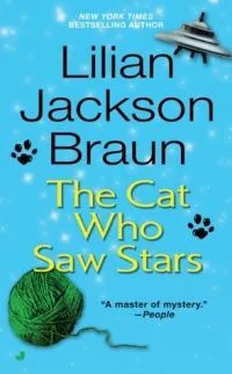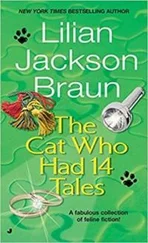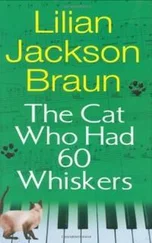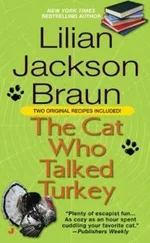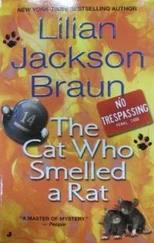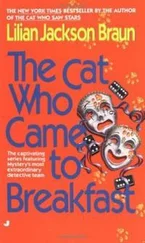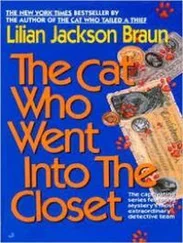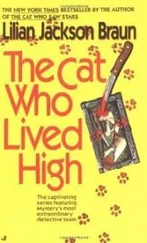Late that night the three of them sat on the porch in the dark: Koko gazing at the constellations from his private planetarium, Yum Yum fascinated by the fireflies, Qwilleran thinking his thoughts. Brodie’s remark about the condition of the backpacker’s body piqued his curiosity. Tomorrow he would drive to Fishport to buy some of Mrs. Hawley’s home-bakes, express his relief that the fate of the young man was known, and find out how she and Magnus felt identifying the body.
-5-
Friday was a gala day in Mooseville, as vacationers and locals looked forward to opening night of the barn theater. Qwilleran had promised to review the play and would first have dinner at Owen’s Place; he wished Polly could be with him.
Meanwhile, he had to finish a “Qwill Pen” column and take it to the bank to be faxed before noon. He found Main Street in the throes of a holiday weekend. Throngs of vacationers sauntered along the sidewalks, looked in shop windows, licked ice cream cones, and were mesmerized by the waterfront: the lake lapping against pilings, boats gently nudging the piers, screaming seagulls catching stale bread crusts on the fly.
Next on his schedule was a drive to Fishport. What would Doris Hawley have to say about the grim task of identifying the backpacker? As soon as he crossed the Roaring Creek bridge, however, he realized it was the wrong time to ask prying questions about the condition of the corpse. Two police cars were parked in the driveway - one from the sheriff’s department and the other from the state troopers’ post. Furthermore, the sign on the front lawn was covered with a burlap sack, a signal that there were no baked goods for sale. He made a U-turn and returned to Mooseville.
Back in town he went into the post office and found some more postcards from Polly. He had complained, while driving her to the airport, that she never kept in touch while on vacation. She had replied, with a cryptic smile, that she would do something about it. “Doing something about it” meant mailing six cards a week-a kind of playful overkill.
In the lobby of the post office he saw a young woman he knew, unlocking a rental box and scooping handfuls of mail into a tote bag.
“What are you doing here?” he asked. “Shouldn’t” you be at home? Homeschooling your brats around the kitchen table?”
She was Sharon Hanstable - plump, good-natured, and wholesomely pretty - a young version of her mother, Mildred Riker. She was also the wife of Roger MacGillivray, a reporter for the Moose County Something.
“I work part time at the Great Dune Motel,” she explained, “and Roger’s home with the kids today. He takes the weekend shift at the paper so he can have two weekdays free.”
Both parents were former teachers. Sharon, after leaving that career to raise a family, was always popping up in part-time roles - as a cashier or salesclerk or short-order cook. This was an aspect of small-town life that still astounded Qwilleran.
“If you’re on your way to work,” he said, “I’ll walk with you and carry your
mail… Are you still enthusiastic about homeschooling?” he asked as they headed for Sandpit Road.
“It’s a big job and a serious responsibility, but also a challenge and a joy,” she replied. “We spend more time with our kids in positive ways. Would you like to try a session of teaching some afternoon, Qwill?”
“No, thanks. I’ll take your word for it.”
“Mother takes a day once in a while, so Roger and I can get away.”
“Your mother is a former teacher. What’s more, she has a heart of gold and the patience of a saint. She probably enjoys being a grandmother.”
They had pushed through the heavy pedestrian traffic on Main Street and were walking down Sandpit Road. Sharon said, “Did you hear that they found the backpacker? It’ll be in today’s paper. Roger’s been on the story since Wednesday, and he happens to know they’ve sent the body to the state pathologist, although they’re not releasing the information. There’s something unusual about the death.” She lowered her voice. “Mother and Roger and I think it has something to do with the Visitors from outer space.”
“Is that so?” he murmured.
“Don’t mention it to Arch. You know how he is. Couldn’t you gently talk some sense into his head, Qwill?”
“I doubt whether I’m the one to try,” Qwilleran said with tact. “How do you explain all this to your youngsters?”
“We tell them the universe has room for many worlds, some with intelligent life. Alien beings are curious about our planet, just as we’re interested in getting to Mars and beyond.”
“Have your kids sighted any of these… Visitors?”
“No, we’re away from the water and don’t stay up late - Mother says two A.M. is the best time for sightings.”
They had reached the Great Dune Motel, and he handed over the tote bag. “Have you been to lunch at Owen’s Place?”
“Too expensive. I carry my lunch. Also, my boss is miffed because they’re staying at the hotel instead of with us.”
Owen’s Place stood alone on the west side of the highway, although its stained cedar siding matched that of the motel, antique shop, fudge kitchen, and other enterprises on the east side. It had been a coin-operated laundry for several seasons before becoming an unsuccessful Chinese restaurant. Now, in the large front windows, the red velvet draperies of its bok choy period had been replaced with white louvered shutters. With the parking lot paved, and the Great Dune as a noble background, it looked quite elegant, and Qwilleran looked forward to dining there before the theater.
The chamber of commerce must have offered Bowen a good deal, Qwilleran thought. Otherwise, why would a man with contempt for country folk choose to spend the summer 400 miles north of everywhere? Evidently the lake was the attraction, since he had a boat. A recreation vehicle with a boat hitch could be seen around the rear of the restaurant, as well as a white convertible, both with Florida tags.
Walking back toward Main Street, Qwilleran passed Arnold’s Antique Shop - and stopped short. There in the window was the kind of spindly, high-backed antique chair that had been on the float with the sheep. It was a chair design with character, and it aroused his curiosity. He went into the shop.
There were several customers, either buying or browsing: According to their dress and mannerisms, Qwilleran could classify them as campers, or wives of sport fishermen, or boaters from the Grand Island Club who had just lunched at Owen’s Place.
The lunch crowd was raving about the chef, the quiche, the skewered potatoes, and the “perfectly darling” maitre d’. Arnold himself was everywhere at once. He was an ageless man with tireless energy, but he had a weathered face that looked like the old woodcarvings he sold. Peering over rimless glasses, he sorted the idle browsers from the potential customers and kept an eye on the former.
A longhaired white-and-black dog wagged a plumed tail at the latter. “Good dog! Good dog!” Qwilleran said to him.
“Hi, Mr. Q! Do you like our pooch?” Arnold asked. “He just wandered in one day. A friendly soul! Brings in more business than an ad in your newspaper!”
“What’s his name?”
“Well, you see, we bought a job lot of china that included a dog dish with the name Phreddie on it, so we named the dog to match the dish… Excuse me.”
Arnold went off to take a customer’s money. A man was buying a rusty iron wheel, four feet in diameter but delicate in its proportions, with sixteen slender spokes.
“Beautiful rust job, smooth as honey,” the dealer told the purchaser. “It threshed a lot of wheat in its day.”
Meanwhile, Qwilleran poked through baskets of arrowheads, Civil War bullets, and old English coins. “What’s that guy going to do with the wheel?” he later asked Arnold.
Читать дальше
